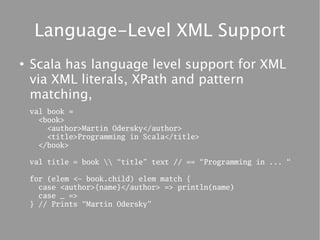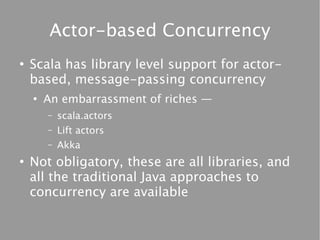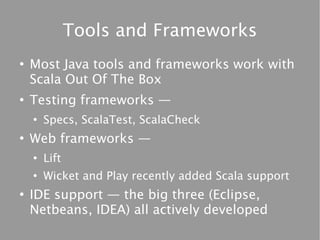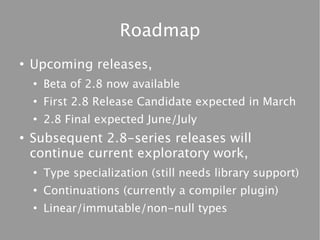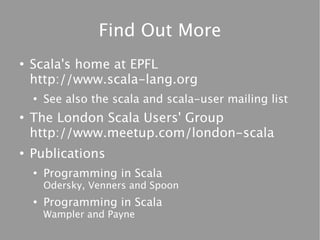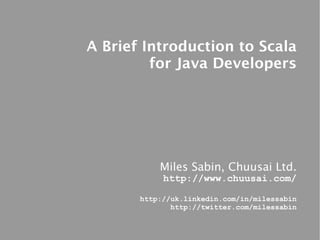Scala is a programming language that blends object-oriented and functional programming styles. It is designed to interoperate with Java code and runs on the Java Virtual Machine. Some key features of Scala include case classes, pattern matching, traits for mixing functionality, and immutable data structures. Scala code compiles to Java bytecode, allowing seamless use of Java libraries and tools.
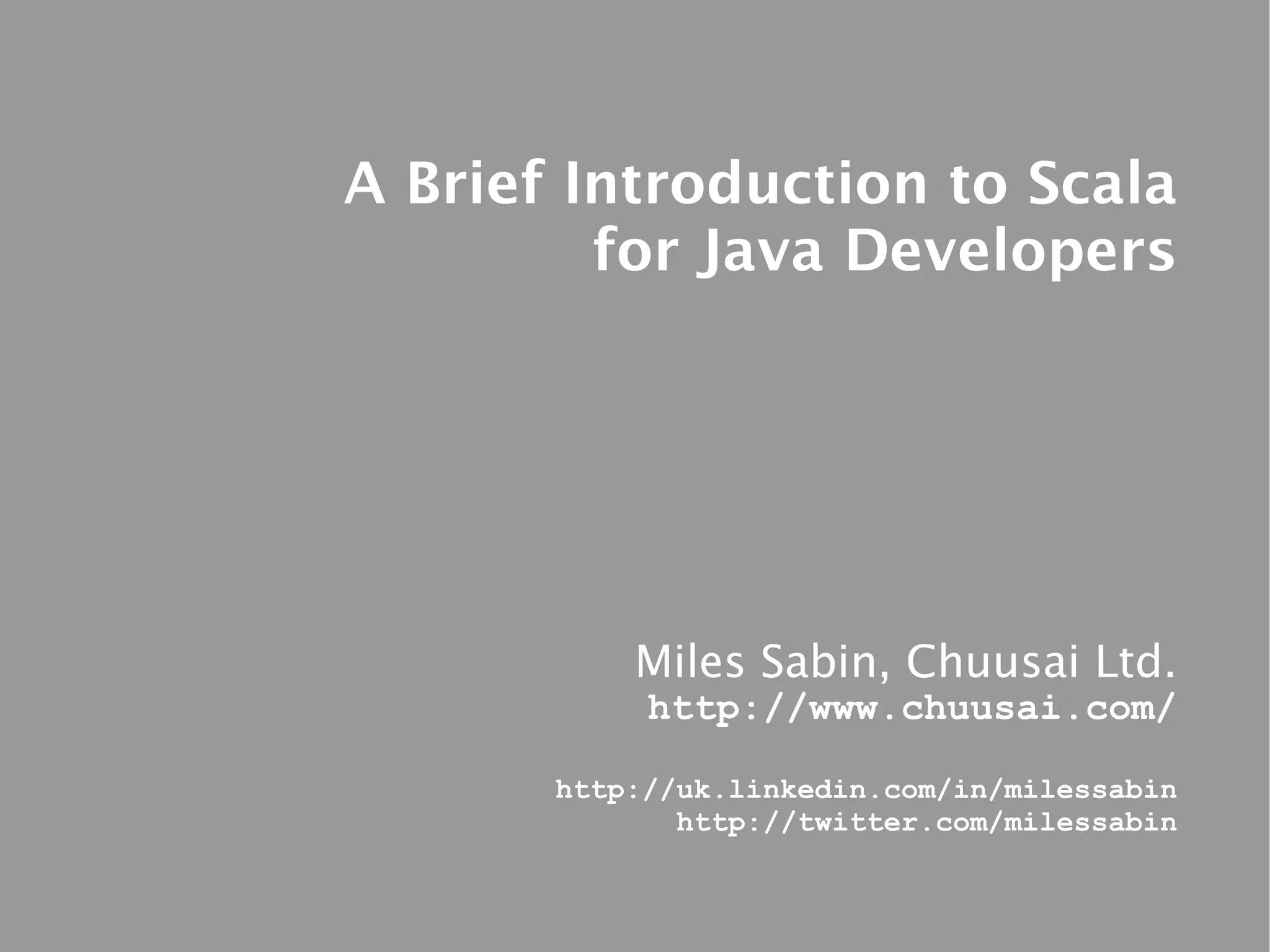
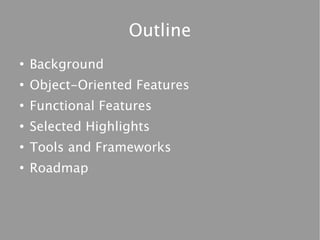
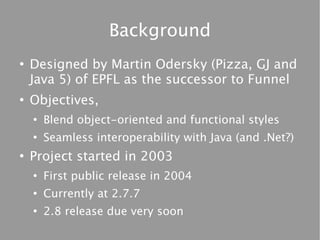
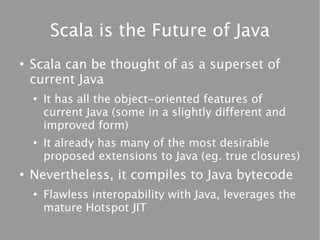
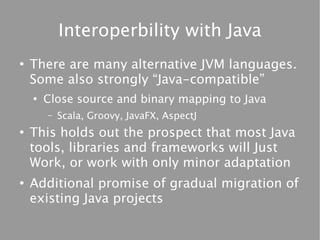
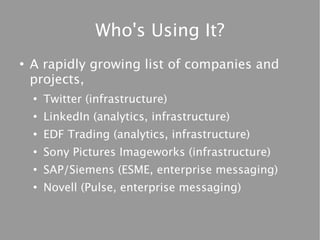

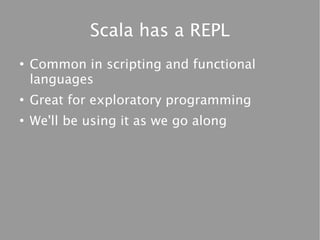
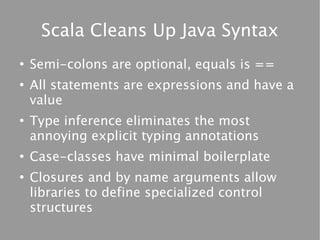
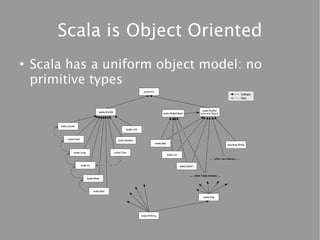
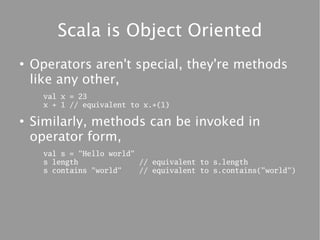
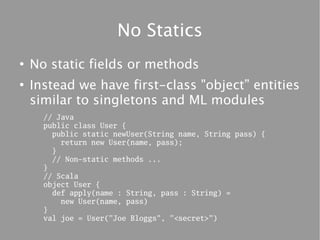
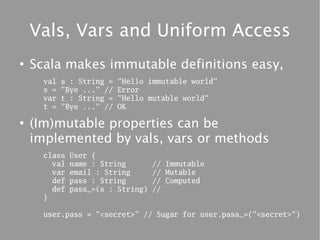
![Statically Typed with Inference
●
All definitions must have a static type
val m : Map[Int, String]
●
However these types are typically inferred
scala> val m = Map(1 -> "one", 2 -> "two")
m : Map[Int, String] = Map(1 -> one, 2 -> two)
●
Method return types are also inferred
scala> def twice(i : Int) = i*2
twice: (i: Int)Int
Argument types must be explicit, also the
return types for recursive functions](https://image.slidesharecdn.com/skillsmatter-20100128-100205152200-phpapp01/85/A-Brief-Introduction-to-Scala-for-Java-Developers-14-320.jpg)
![Named and Default Arguments
●
Arguments can be specified at call sites by
name
def coord(x : Double, y : Double)
coord(y = 1.0, x = 0.7)
Allows them to be provided naturally for
the call site, and eliminates ambiguity
●
Arguments can also be given default values
def printList(l : List[Int], sep : String =", ") { ... }
val l = List(1, 2, 3)
printList(l) // equivalent to printList(l, ", ")](https://image.slidesharecdn.com/skillsmatter-20100128-100205152200-phpapp01/85/A-Brief-Introduction-to-Scala-for-Java-Developers-15-320.jpg)
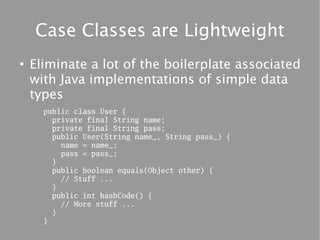
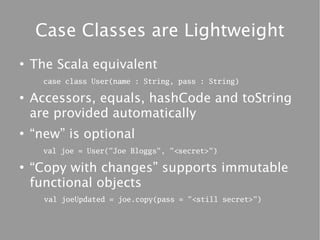
![Pattern Matching
●
Case classes model ADTs from functional
languages and support pattern matching
sealed trait Tree[T]
case class Leaf[T](elem : T) extends Tree[T]
case class Node[T](left : Tree[T], right : Tree[T])
val t = Node(Node(Leaf("bar"), Leaf("baz")), Leaf("foo"))
def find[T](tree : Tree[T], elem : T) : Boolean =
tree match {
case Node(l, r) => find(l, elem) || find(r, elem)
case Leaf(`elem`) => true
case _ => false
}
●
Matching is the inverse of construction](https://image.slidesharecdn.com/skillsmatter-20100128-100205152200-phpapp01/85/A-Brief-Introduction-to-Scala-for-Java-Developers-18-320.jpg)
![The Option Type
●
“Null References: The Billion Dollar
Mistake” — Tony Hoare
●
Scala provides a safe alternative
scala> List(1, 2, 3) find (_ == 2)
res0: Option[Int] = Some(2)
scala> List(1, 2, 3) find (_ == 4)
res0: Option[Int] = None
●
Option interacts nicely with matching
List(1, 2, 3) find (_ == 2) match {
case Some(i) => println("Found "+i)
case None => println("Not found")
}](https://image.slidesharecdn.com/skillsmatter-20100128-100205152200-phpapp01/85/A-Brief-Introduction-to-Scala-for-Java-Developers-19-320.jpg)
![Tuples
●
Scala has tuple types and literals
val coord : (Double, Double) = (1.0, 0.5)
println("x = "+coord._1+", y ="+coord._2)
●
These are first-class types like any other
val coords = new ListBuffer[(Double, Double)]
coords += coord
●
Provide ad hoc grouping and multiple
return values
def firstWord(s : String) = {
val i = s+" " indexOf ' '
(s.substring(0, i), s.substring(i, s.length))
}
val (first, rest) = firstWord("The quick brown fox ...")](https://image.slidesharecdn.com/skillsmatter-20100128-100205152200-phpapp01/85/A-Brief-Introduction-to-Scala-for-Java-Developers-20-320.jpg)
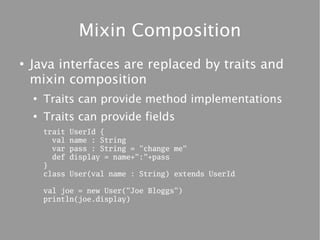
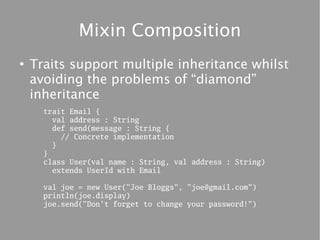
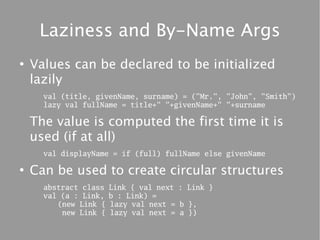
(op : => T) = {
l.lock
try { op } finally { l.unlock }
}
val lock = new ReentrantLock
var shared = ...
locked(lock) {
/* Use shared while holding lock */
}](https://image.slidesharecdn.com/skillsmatter-20100128-100205152200-phpapp01/85/A-Brief-Introduction-to-Scala-for-Java-Developers-24-320.jpg)
(op : R => T) =
try { op(res) } finally { res.close() }
val b = using(new FileInputStream("test.txt")) { _.read }](https://image.slidesharecdn.com/skillsmatter-20100128-100205152200-phpapp01/85/A-Brief-Introduction-to-Scala-for-Java-Developers-25-320.jpg)
(op : R => T) =
try { op(res) } finally { res.close() }
implicit def InputStreamIsCloseable(is : InputStream) =
new Closeable { def close = in.close }
val b = using(new FileInputStream("test.txt")) { _.read }](https://image.slidesharecdn.com/skillsmatter-20100128-100205152200-phpapp01/85/A-Brief-Introduction-to-Scala-for-Java-Developers-26-320.jpg)
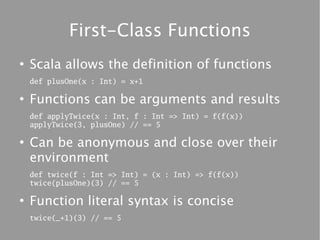
![Higher-Order Functions
●
Higher-order functions are used
extensively in Scala's standard library
List(1, 2, 3).map(_*2) // == List(2, 4, 6)
List(1, 2, 3, 4).find(_%2 == 0) // Some(2)
List(1, 2, 3, 4).filter(_%2 == 0) // List(2, 4)
def recip(x : Int) = if(x == 0) None else Some(1.0/x)
scala> List(0, 1, 2, 3).flatMap(recip)
res0: List[Int] = List(1.0, 0.5, 0.3333333333333333)](https://image.slidesharecdn.com/skillsmatter-20100128-100205152200-phpapp01/85/A-Brief-Introduction-to-Scala-for-Java-Developers-28-320.jpg)
![For Comprehensions
●
Scala's “for comprehensions” capture
common patterns of use of map, flatMap
and filter
val l1 = List(0, 1)
val l2 = List(2, 3)
scala> for (x <- l1; y <- l2) yield (x, y)
res0: List[(Int, Int)] = List((0,2), (0,3), (1,2), (1,3))
The for expression desugars to,
l.flatMap(x => l2.map(y => (x, y))
●
These patterns are the monad laws for the
subject type](https://image.slidesharecdn.com/skillsmatter-20100128-100205152200-phpapp01/85/A-Brief-Introduction-to-Scala-for-Java-Developers-29-320.jpg)
![For Comprehensions
●
Option implements map, flatMap and Filter
so works nicely with for comprehensions
def goodPair(x : Int, y : Int) =
for(fst <- recip(x); snd <- recip(y))
yield (x, y)
scala> goodPair(1, 2)
res0: Option[(Int, Int)] = Some((1,2))
scala> goodPair(1, 0)
res0: Option[(Int, Int)] = None
●
Using Option rather than null has clear
benefits when used in this way](https://image.slidesharecdn.com/skillsmatter-20100128-100205152200-phpapp01/85/A-Brief-Introduction-to-Scala-for-Java-Developers-30-320.jpg)
